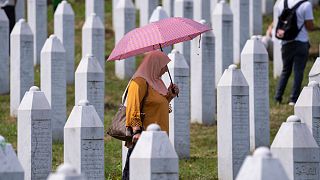By Euronews with AP • Updated: 23/07/2021 -

A woman visits the memorial cemetery in Potocari near Srebrenica.
- Copyright AP Photo/Darko Bandic
A senior international official in Bosnia has banned the denial of genocide under the country's criminal law.
The move is an effort to counter attempts by Bosnian Serbs to deny the significance of the 1995 massacre in Srebrenica when more than 8,000 Muslims were murdered by Serb forces.
The massacre was declared a genocide by both the International Court of Justice and the International Criminal Court for Former Yugoslavia.
But Bosnian Serb officials and authorities in neighbouring Serbia have refused to accept this, insisting that the massacre was a crime but did not constitute genocide.
On Friday, the outgoing head of Bosnia’s Office of the High Representative (OHR), Valentin Inzko, imposed changes to the Balkan country's legislation to prevent denials of genocide.
The amendments also convict people for glorifying war criminals, including by naming streets or public institutions after them. Anyone found guilty under the new law faces a prison sentence of up to five years.
The new law has been welcomed by Bosniak politicians and the relatives of the Srebrenica victims but has been swiftly rejected by Bosnian Serb leader Milorad Dodik.
"Republika Srpska [the Serb entity in Bosnia] rejects this, genocide did not happen, Serbs must never accept this," he told reporters.
Dodik has repeatedly criticised the OHR and the West as biased against Serbs in Bosnia.
Montenegro justice minister ousted over Srebrenica genocide denial
A senior international official in Bosnia has banned the denial of genocide under the country's criminal law.
The move is an effort to counter attempts by Bosnian Serbs to deny the significance of the 1995 massacre in Srebrenica when more than 8,000 Muslims were murdered by Serb forces.
The massacre was declared a genocide by both the International Court of Justice and the International Criminal Court for Former Yugoslavia.
But Bosnian Serb officials and authorities in neighbouring Serbia have refused to accept this, insisting that the massacre was a crime but did not constitute genocide.
On Friday, the outgoing head of Bosnia’s Office of the High Representative (OHR), Valentin Inzko, imposed changes to the Balkan country's legislation to prevent denials of genocide.
The amendments also convict people for glorifying war criminals, including by naming streets or public institutions after them. Anyone found guilty under the new law faces a prison sentence of up to five years.
The new law has been welcomed by Bosniak politicians and the relatives of the Srebrenica victims but has been swiftly rejected by Bosnian Serb leader Milorad Dodik.
"Republika Srpska [the Serb entity in Bosnia] rejects this, genocide did not happen, Serbs must never accept this," he told reporters.
Dodik has repeatedly criticised the OHR and the West as biased against Serbs in Bosnia.
Montenegro justice minister ousted over Srebrenica genocide denial
Serbia's Vucic hits back as Montenegro bans Srebrenica genocide denial
The US Embassy in Bosnia said on Friday that "genocide denial and war criminal glorification are unacceptable and undermine the mutual trust."
"We must underscore that the genocide at Srebrenica is not a matter of debate, but of historical fact. It is time to truly turn to a future based on peace and mutual trust."
The OHR acts as the top international body overseeing the implementation of the peace agreement that ended Bosnia’s 1992-95 war.
The office also has the authority to impose decisions or dismiss officials who undermine the post-war ethnic balance and reconciliation efforts between Bosniaks, Bosnia’s Serbs, and Croats.
No comments:
Post a Comment